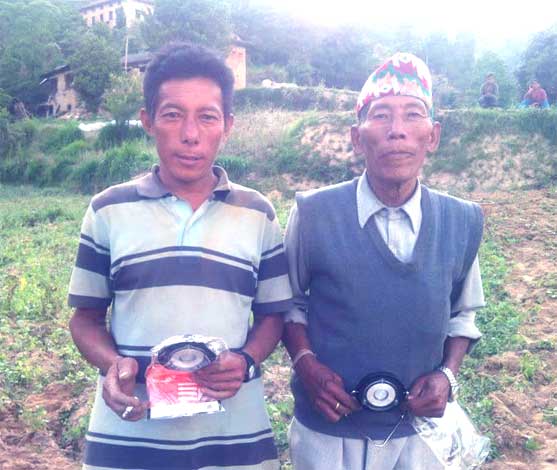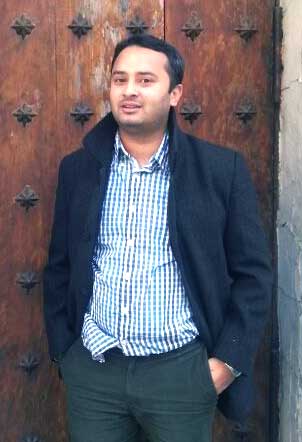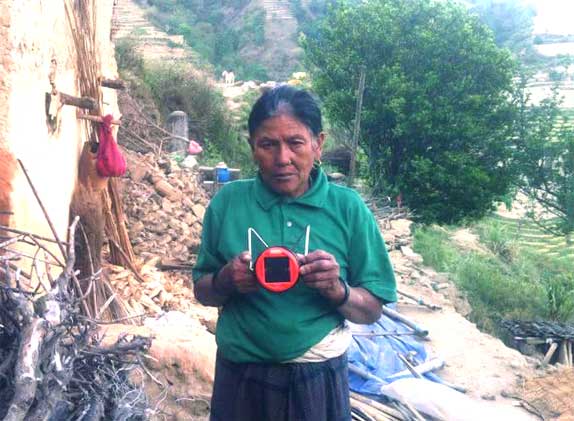After the devastating earthquake this year, Nepal is struggling to bounce back. While international support and initiatives within Nepal have been remarkable, given the scale of the disaster, relief and rehabilitation work is full of daunting challenges.
The disaster, on the other hand, has encouraged many Nepalis to come up with creative and innovative solutions, ultimately helping to cope with the aftermath and accelerating the process of restoring Nepal back to normalcy. Earthquake mobile apps and one-storey bamboo houses were not the topics many Nepalis cared about before the disaster. Now they are everywhere.
While the government of Nepal and international aid agencies seem to still promoting traditional-style relief and rehabilitation work, it’s mainly youth-led non-profits and business start-ups that have come up with innovative ideas. One such example is a Kathmandu-based start-up, Ecoprise, which has started distributing solar-powered lamps and mobile chargers in earthquake-affected areas.” This will help earthquake-affected communities to feel safe at night and stay connected to support one another through this difficult time,” says the company’s founder and CEO Bhuwan KC.
KC is a unique example himself. While almost all of his former classmates and many of his friends have left Nepal in search of opportunities abroad; he has stayed in Nepal and runs a couple of successful start-ups, creating employment for dozens of Nepali youths in Nepal.
Now when the country which has given him so much is suffering, he wants to give back by helping heal its wounds faster. KC’s start-up Ecoprise specializes in clean/alternative energy and that’s what he wants to employ to help earthquake-struck Nepali hinterlands.

Ecoprise has already distributed several units of solar-power lamps for free in disaster-hit remote communities. However, the demand is simply high. After losing everything in the disaster, affected communities can’t buy such products themselves, and since Ecoprise is a small company, it can’t keep distributing its products en masse for free. That’s when KC came up with the idea of crowd-funding.
His fund-raising campaign on the crowd-funding site Indiegogo aims to raise enough funds to cover up to 1000 families in Sindhupalchowk and Kavre districts where more than 3000 people lost their lives and over 100,000 were left homeless.
Read Also: Nepal’s Earthquake Aftermath: Now How to Prevent a Social Disaster?
KC and Ecoprise clearly understand that it’s not time to do business and make a profit, and have declared that every penny they receive in donations will go to cover the costs of acquiring more solar-powered lamps, mobile chargers and water purifiers for free distribution. Every $50 will help get solar lighting & mobile chargers for one family and every $70 will provide 20 litres of clean drinking water every day.
“In addition to solar-powered lamps, we are providing solar-powered water purifiers to avoid waterborne diseases,” says KC. Ecoprise has teamed up with a Swedish clean-tech company to supply portable water purifiers in rural Nepali communities.
Initiatives and actions like these make one believe that Nepal will bounce back soon and Nepal’s creative and energetic youths are the ones leading this difficult task.
(Donations to KC’s campaign can be made through his crowd-funding page and a short interview with KC can be read next.)

How did you come up with the idea of easing Nepal’s pain through clean technology?
After the earthquake, while many initiatives were focused towards providing relief materials i.e. tarpaulins, food, bottled water, and dry foods, we thought of utilizing our expertise and knowledge of solar technologies which could help these communities recover from this disaster.
Why is that necessary?
Many communities are disconnected from the national electricity grid and the Nepal Electricity Authority (NEA) has mentioned that the earthquake caused damages worth more than USD 100 million, which means it will take time for the government of Nepal to connect to the national grid. We immediately started distributing lamps from our inventory to help these communities. However, we could not meet the huge demand from the affected communities and relief workers. That’s when we decided to set up this Indiegogo crowdfunding page to raise money so that we could buy more lamps and water purifiers.
Could you elaborate a bit on the philanthropic/humanitarian work you have been doing (through entrepreneurship) in recent years?
At Ecoprise we have been providing solar loans to homes and businesses without any collateral at a 5% interest rate, the lowest in Nepal. Besides that, we also trained local women groups to assemble solar lamps. This has created employment opportunities for these needy families and also empowered these women. We have distributed over 300 lamps to various communities in earthquake-affected communities since 25 April.
Do you have any partner organizations collaborating with you? We have partnered with 365 Innovations a local not-for-profit group to select and distribute these lamps. 365 Innovations builds linkages, capacities and support systems to harness the power of people and organizations. Our programs and projects are focused on entrepreneurship, employability and empowerment. 365 will develop a proper distribution channel and work with its local partners to ensure that the right people get access to these lamps. We will get these solar lanterns from Barefoot Power and water purifiers from Solvatten, Sweden.
What’s your distribution mechanism? Who is going to do it and how do you select your beneficiaries?
We select them on the basis of the impact the earthquake had on their villages, their economic status and whether they represent a disadvantaged group. We have already carried relief work in these communities so we have established a firm understanding of their needs.











